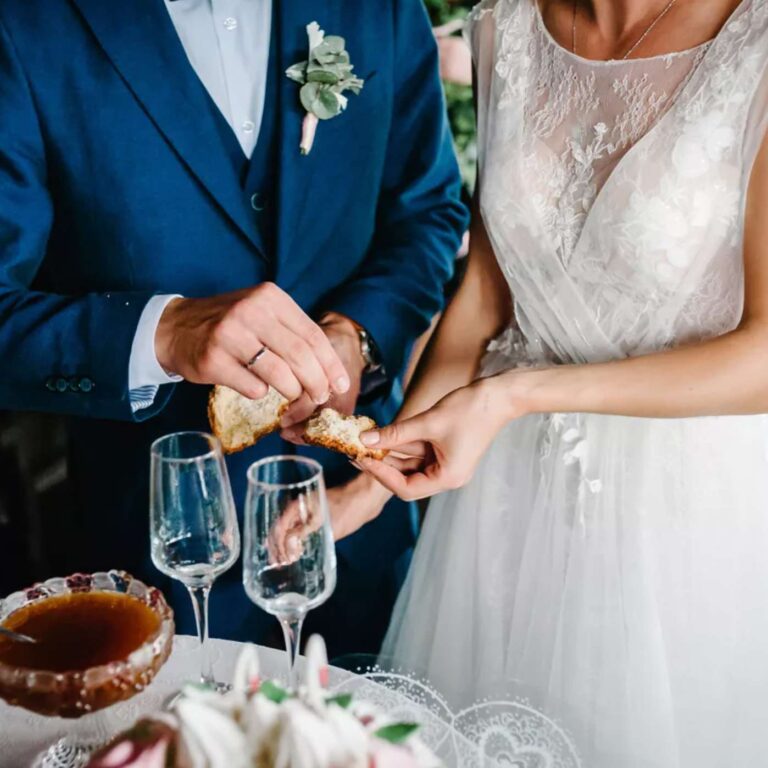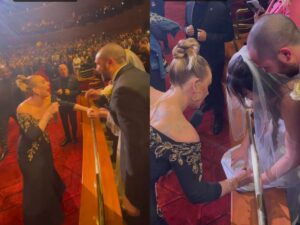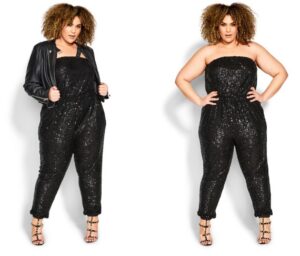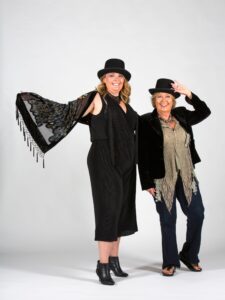For a Muslim wedding, it is recommended to wear modest and culturally appropriate attire.
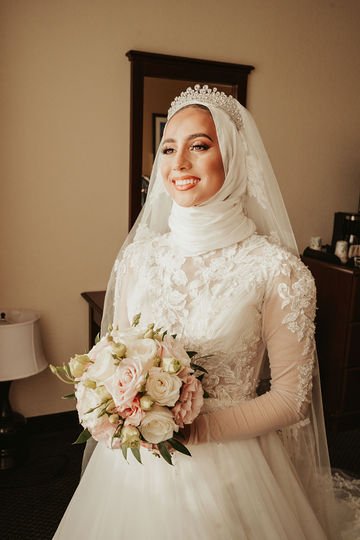
Credit: www.visualartistry.co
1. Traditional Muslim Wedding Attire
When attending a Muslim wedding, it is important to dress modestly and respect the religious and cultural customs. Traditional Muslim wedding attire varies depending on the region, but the common theme is modesty and elegance. For men, a formal suit with a traditional Islamic cap, such as a fez or a kufi, is appropriate. Women typically wear beautiful abayas, which are floor-length robes, often decorated with intricate embroidery or embellishments. These can be paired with a hijab, a headscarf that covers the hair, neck, and shoulders. Modesty is key, so it’s important to avoid revealing or tight-fitting clothing. It’s also a good idea to stick to muted and conservative colors, such as black, white, or pastels. By following these guidelines, you can ensure that you are dressed respectfully and appropriately for a Muslim wedding.
2. Stylish Hijab Options For Women
When it comes to attending a Muslim wedding, women can elevate their outfits with stylish hijab options. Hijabs not only serve as a religious requirement but also make a fashion statement. There are various hijab styles and materials to consider, allowing women to express their personal style while staying modest.
One popular hijab style is the traditional wrap, which involves draping the fabric over the head and securing it with pins. For a more modern and trendy look, women can opt for a turban-style hijab that wraps around the head, creating a chic and sophisticated appearance.
Additionally, there are pleated hijabs that provide volume and dimension to the overall outfit. These hijabs can be paired with embroidered or embellished fabric for a glamorous touch.
When choosing a hijab, consider the material as it impacts the overall look and comfort. Chiffon hijabs offer a lightweight and flowy option, perfect for summer weddings. Alternatively, silk hijabs exude elegance and can be a great choice for formal events.
Overall, hijabs can be a beautiful accessory that complements any outfit at a Muslim wedding. Exploring different styles and materials allows women to find the perfect hijab that showcases their individual style and cultural identity.
3. Appropriate Colors And Fabrics
Colors to avoid and embrace in Muslim wedding attire:
When choosing what to wear at a Muslim wedding, it’s important to consider the appropriate colors and fabrics. Avoid wearing white, as it is traditionally reserved for the bride. Black is also best avoided, as it is often associated with mourning. Instead, embrace vibrant and bold colors such as red, purple, and gold. These colors not only exude celebration but also complement the joyful atmosphere of a wedding.
In terms of fabrics, it is recommended to opt for comfortable and elegant choices. Light and breathable fabrics like chiffon and silk are ideal for wedding attire, as they allow for easy movement and keep you cool throughout the festivities. Moreover, fabrics with intricate designs and embellishments, such as lace or brocade, add an extra touch of glamour and sophistication to your outfit.
4. Dressing Etiquette For Non-muslim Guests
Attending a Muslim wedding as a non-Muslim guest requires careful consideration of dressing etiquette to respect religious customs. It is essential to choose appropriate attire that adheres to modesty standards. For women, dress lengths should preferably be below the knee or ankle-length, with long sleeves and high necklines. Flowy and loose-fitting dresses made of lightweight materials such as chiffon or silk are a popular choice. Pairing the outfit with a matching hijab can further enhance modesty. Men should opt for formal attire such as suits or traditional clothing like a thobe or sherwani. It is important to refrain from wearing revealing or tight-fitting clothing, as well as open-toe shoes or sandals. By following these guidelines, non-Muslim guests can show their respect for the Islamic customs and traditions associated with a Muslim wedding.
5. Accessorizing For Elegance
htmlFor a Muslim wedding, it is important to dress modestly and elegantly. When it comes to accessorizing your outfit, choosing the right jewelry can enhance your overall look. Opt for delicate and understated pieces that complement your attire without overpowering it. Avoid excessive bling or heavy statement jewelry that can clash with the traditional and sophisticated atmosphere of a Muslim wedding.
For women, consider wearing a pair of elegant earrings that match the color and style of your dress. Delicate necklaces or pendants can also add a touch of elegance to your attire. Opt for bracelets or bangles that are not overly chunky, and choose ones that coordinate with the rest of your jewelry. Remember, less is more when it comes to accessorizing for a Muslim wedding.
For men, focus on styling your outfit with accessories that exude sophistication. A classic watch is a timeless addition to any formal attire. Opt for a belt that complements the color of your shoes and matches the overall color scheme of your outfit. When it comes to traditional headwear, consider wearing a turban or cap that complements your attire.
Remember, the key is to keep your accessories simple and tasteful. By choosing the right jewelry and accessories, you can create an elegant and sophisticated look for a Muslim wedding.
6. Footwear For A Muslim Wedding
When attending a Muslim wedding, it is important to dress appropriately to respect the culture and customs. While choosing footwear, both men and women have several suitable options to consider. For men, traditional oxford shoes or loafers in neutral colors like black, brown, or navy are an excellent choice. These shoes provide a formal and classy look. For women, closed-toe heels or pumps in metallic or neutral shades are preferred. Opt for comfortable yet stylish designs to ensure you can confidently enjoy the festivities without discomfort. Consider materials like silk or satin, which add an elegant touch to your outfit. Lastly, don’t forget to match the color of your shoes to your attire. By following these tips, you can attend a Muslim wedding with grace and style.
7. Makeup And Hairstyle Ideas
When attending a Muslim wedding, it is important to dress appropriately and respect the cultural customs. However, this does not mean you cannot look stylish and glamorous. Here are some makeup and hairstyle ideas that will help you create a modest look while enhancing your natural beauty.
For makeup, opt for soft and subtle colors that complement your skin tone. Choose natural-looking foundations and concealers that provide coverage without looking heavy. Enhance your eyes with neutral eyeshadows and use waterproof mascara and eyeliner for long-lasting wear. Add a touch of color to your cheeks with blush and opt for a nude or light pink lipstick to complete the look.
When it comes to hairstyles, consider options that work well with hijabs and traditional attire. Try a simple yet elegant updo, such as a bun or a twisted hairstyle. You can also add accessories like hairpins or headbands to elevate your look. If you prefer to keep your hair down, opt for loose waves or curls. Make sure to use a hairspray or hair gel to keep your hairstyle in place throughout the wedding celebrations.
8. Dressing For Different Types Of Muslim Weddings
Attending a Muslim wedding requires dressing appropriately based on the type of event and cultural norms. Whether it’s a traditional, modern, or fusion wedding, following attire guidelines is crucial. For traditional weddings, women are advised to wear modest clothing such as long dresses or skirts and cover their shoulders and arms. Men can choose to wear a suit or a traditional attire like a kurta pajama. In modern weddings, guests have more flexibility in terms of attire. Women can opt for elegant dresses or formal pantsuits, while men can wear suits or traditional attire. Fusion weddings allow for a mix of cultural influences, so guests can experiment with fusion outfits like sarees paired with western blouses or modern sherwanis. It’s also important to consider the venue and climate when selecting attire. (Table 1)
| Traditional Wedding | Modern Wedding | Fusion Wedding |
|---|---|---|
| Modest clothing | Elegant dresses or pantsuits | Fusion outfits |
| Shoulder and arm coverage | Flexibility in attire | Experiment with cultural mixes |
| Kurta pajama for men | Suits or traditional attire | Blend of sarees and western blouses |
Overall, attending a Muslim wedding calls for respectful and culturally appropriate attire. By following these guidelines and considering the type of event, venue, and cultural variations, you can ensure you are dressed appropriately to celebrate this joyous occasion.
9. Mistakes To Avoid In Muslim Wedding Fashion
Steering clear of fashion mistakes at a Muslim wedding is essential to maintain cultural sensitivity while expressing personal style. It’s important to dress modestly, respecting the religious and cultural customs. Some common fashion faux pas to avoid include:
- Revealing or tight-fitting clothing
- Wearing transparent or sheer fabrics
- Choosing inappropriate colors
- Donning excessive or flashy jewelry
- Ignoring the requirement of a head covering for women
- Not considering the weather and venue when selecting attire
- Wearing shoes that are uncomfortable or inappropriate for the occasion
- Disregarding the importance of cultural traditions
- Neglecting to research and understand the specific dress code
By avoiding these mistakes, attendees can ensure they dress respectfully and appropriately, while still showcasing their personal style. Remember, modesty and cultural sensitivity are key when selecting an outfit for a Muslim wedding.
10. Final Tips For Choosing The Perfect Outfit
Choosing the perfect outfit for a Muslim wedding can be a daunting task, but it’s important to dress appropriately and comfortably for the occasion. Here are some factors to consider when selecting your attire:
1. Modesty: Modesty is key when attending a Muslim wedding. Opt for outfits that cover your shoulders, arms, and knees. Avoid clothing that is too revealing or tight-fitting.
2. Cultural Sensitivity: Respect the cultural traditions of the couple and their families. Consider wearing traditional attire such as a saree or salwar kameez for women, or a kurta pajama for men.
3. Color: Choose colors that are appropriate for the occasion. Avoid wearing white, as it is traditionally associated with mourning in some Muslim cultures. Opt for vibrant colors or pastel shades instead.
4. Comfort: Make sure your outfit is comfortable to wear throughout the wedding ceremonies and reception. Avoid heavy fabrics or excessive embellishments that may restrict your movement.
5. Footwear: Opt for comfortable footwear that matches your outfit. Consider wearing flats or low-heeled shoes, as you may be required to remove your shoes before entering certain areas.
6. Accessories: Keep your accessories simple and elegant. Avoid wearing excessive jewelry or accessories that may be considered distracting or inappropriate.
7. Checklist: Before finalizing your outfit, create a checklist to ensure that you have considered all the necessary factors. This will help you make an informed decision and avoid any last-minute wardrobe malfunctions.
By following these tips, you can ensure that you are dressed appropriately and comfortably for a Muslim wedding.
Frequently Asked Questions On What To Wear At A Muslim Wedding
What Do Guests Wear At A Muslim Wedding?
Guests at a Muslim wedding usually wear modest and formal attire. This includes women wearing dresses or long skirts with covered shoulders, and men wearing suits or traditional clothing like kurta-pajama. Modesty and respect for the religious customs are important considerations when choosing an outfit.
What Should A Female Guest Wear To A Muslim Wedding?
Female guests should wear modest and conservative attire to a Muslim wedding, such as a long sleeve dress or a pantsuit. It is important to cover the shoulders and knees, and avoid wearing revealing or tight-fitting outfits.
What Do Non Muslims Wear To Muslim Wedding?
Non-Muslims attending a Muslim wedding can wear modest and respectful attire, such as a long dress or a suit. Opt for attire that covers shoulders, chest, and legs. Avoid wearing revealing or flashy outfits. It’s important to show cultural sensitivity and respect for the traditions of the wedding ceremony.
Do You Wear Shoes At A Muslim Wedding?
Yes, it is customary to remove your shoes at a Muslim wedding as a sign of respect.
Conclusion
To conclude, dressing appropriately at a Muslim wedding is a sign of respect for their cultural and religious traditions. By following the guidelines mentioned in this blog post, you can ensure that you are dressed modestly and elegantly to honor the occasion.
Remember, understanding and respecting different customs is essential in a diverse society, and attending a Muslim wedding is an opportunity to celebrate love and unity in a beautiful way. So, dress your best and enjoy being a part of this significant event.

